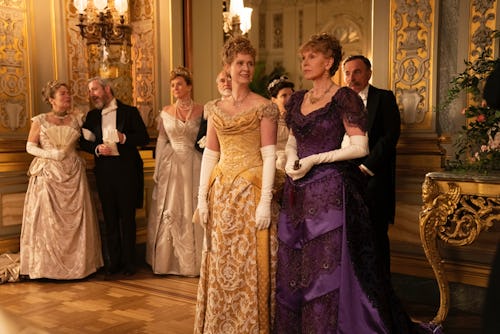
This review contains spoilers.
The Gilded Age is one of the year’s most anticipated shows so far, as creator/writer Julian Fellowes returns to the original upstairs-downstairs conceit that brought about his PBS mega-hit Downton Abbey. As the New York Times reported, Fellowes had wanted to bring this prequel to the silver screen since 2012, but Downton’s dominant path of six seasons and a movie quelled the urgency for an immediate return to the format. While Fellowes worked on other projects, it seems that this one finally squeezed its way into being born through both network changes and pandemic setbacks, and its entry — which premiered on January 24 on HBO Max — feels just as forced. It’s not an irredeemable start to the show, but it may not satisfy the hunger that eager period piece fanatics have craved.
The period piece seems to divide audiences. People either love them or they hate them, unless there are gangsters or serial killers involved like in Gangs of New York and From Hell respectively, which enticed all audiences and alike. But The Gilded Age is very much your run-of-the-mill period drama, with a clunky focus on the social dynamics of the time, namely class (read: your bro-y boyfriend probably won’t watch it with you, but your art school one might).
The show starts off innocuously enough with its focus on Marian Brook, a young woman who is mourning her late father who had lied to her about the family finances and left her single and broke — a very bad place to be in the late 1800s. The first gaff of the show, though, is the stoic way Marian handles the news. She’s seemingly unphased by it, despite a bit of incredulity and shock that her father, the great general that he was, would lie to her. It may appear as an innocuous moment to pull apart, but it sets the tone for an entire episode that’s filled with performances that appear phoned in or overwrought.
Marina (played by Louisa Jacobson, Meryl Streep’s youngest daughter, a newcomer to television who cleverly does not use the Gummer last name her sisters perform under) rarely reacts to anything around her; it may be Jacobson’s attempt at portraying naiveté, but it reads more like a lack of nuance. It doesn’t help that she’s acting across from Cynthia Nixon and Christine Baranski, darlings of the New York theater scene who take their roles and say, “I will act the Edith Wharton bustle off of this old bitch.” The duo play Marina’s elite New York City aunts, whom she travels from rural Pennsylvania to live with, having no other family to save her from a fate as a penniless spinster (worse than death!).
The aunts’ dynamic is the closest thing we get to comedy in the premiere, a facet that often makes or breaks period drama. The ridiculousness of the production needs to be cut with some satirical comedy, or at least some cheeky nods that make fun of itself a little — something 2020’s hit Bridgerton understood perfectly. But what we get here is more like the dueling step sisters from Cinderella than any kind of witty, self-aware commentary. Nixon plays Ada Brook with a goofy obsequiousness, and Baranski plays Agnes Van Rhijn with clichéd snobbishness. But it’s there that the drama is born. After Agnes nauseatingly underlines for Marian that she’s still old money regardless of her father’s exile, she then reminds the room that they won’t be rubbing elbows with any new money — namely the Russells, who have moved across the street into a gaudy new house built by an architect from outside of the Fifth Avenue Rolodex.
The closest thing we get to dynamism is Marina bringing an aspiring Black writer, Peggy Scott (Denée Benton), along with her to Fifth Avenue after Peggy saves her from probable ruin when her purse is stolen along with the very last of her money and train tickets. The tension is built for her aunts to overlook kindness in favor of the racism of the time, but shocker — these rich assholes aren’t racist! It’s the obvert wink that makes it seem like we are meant to like them even though they’re elitist and meddling. Agnes even offers Peggy a job as her secretary, as well as lodging. And while the storyline is a bit far fetched, it offers the biggest hope for something that other period pieces haven’t offered before. It’s the downstairs folks who seem to have the problem with Peggy, saying all too familiar phrases like “they’re coming here to take our jobs.” That is perhaps one of the premiere’s biggest failings as well, especially for the Downton crowd: there is little early attention paid to building the characters of the downstairs staff. They mostly serve as archetypal figure placements like the slutty maid and the mother hen head of house.
All of The Gilded Age’s shortcomings seem to stem from a lack of subtlety. And while of course the period that they are portraying — the period in between the Civil War and the twentieth century that was known for its lavishness and its innovation — was over the top, it doesn’t mean the show has to take a meta approach in reflecting that. We’re hoping that as the series progresses, more unique storylines and dynamic performances will emerge. The set, costumes, and cast are all perfectly in place to make The Gilded Age a great show, it just feels like it needs a little room to breathe. It could take its own advice from the moment in the premiere when Mrs. Russell (Carrie Coon) decides to dial back her ostentatious outfit: “it might be better without the broach.”







